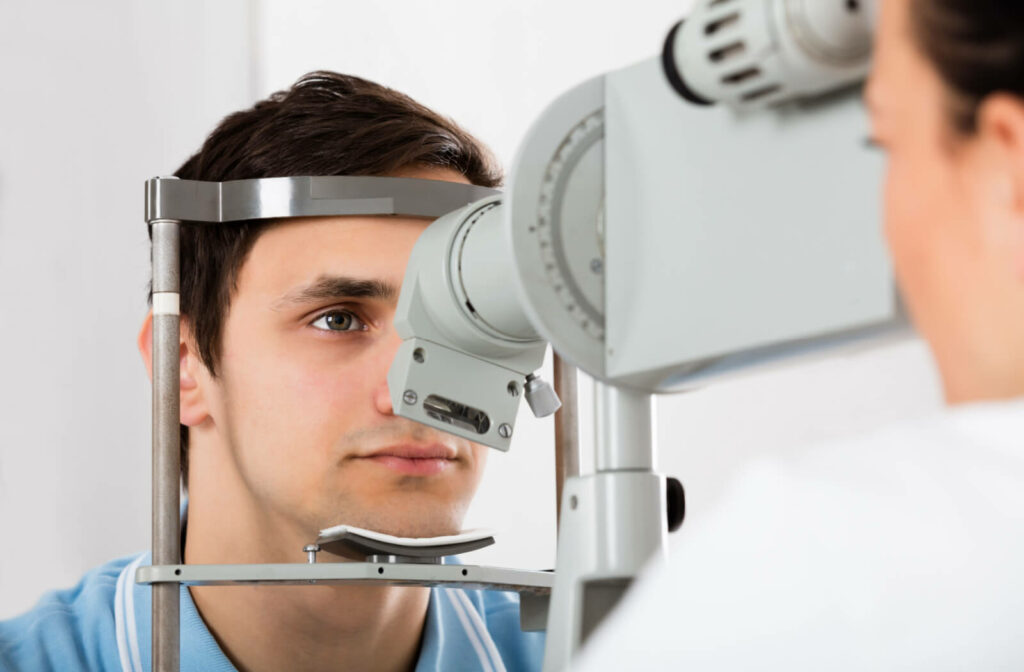Poor eyesight can be frustrating and affect your daily life in many ways, from difficulty reading a book to trouble identifying faces or street signs. But how do you find out what’s causing those visual challenges? Are you born with poor vision, or do external factors contribute to it?
Vision can be worsened by genetics, age, environmental factors, trauma, and medical conditions, but there are options available for correcting bad vision. Glasses and contact lenses can help sharpen your eyesight, but keeping your eyes healthy and comfortable often begins with a comprehensive eye exam.
Factors that Affect Vision Health
Genetics
Some of the most common vision problems, such as nearsightedness (myopia), farsightedness, and astigmatism, can be hereditary and run in families. Those refractive errors can cause a range of vision issues, including:
- Blurry vision
- Trouble focusing
- Double vision
- Hazy vision
- Halos or glares around light
- Squinting
- Headaches
- Eye strain
It’s essential to get regular eye exams to monitor any changes in your sight and continually update your glasses and contact lenses to provide clear vision.
Aging
As you age, your eyes can undergo natural changes that affect your vision and create new refractive errors, such as presbyopia—which can make it difficult to focus on objects up close—or night vision problems. Age-related eye changes can also increase your risk of developing other eye diseases, such as:
- Cataracts
- Glaucoma
- Macular degeneration
- Dry eyes
Aging eyes can also cause low vision issues, where you cannot treat your sight challenges with corrective lenses and experience symptoms such as:
- Difficulty doing everyday tasks
- Difficulty seeing fine details in faces
- Struggling to read close and at a distance
- Feeling like lights and colors are dull
Regular eye checkups help detect age-related vision issues early so we can work with you to manage and treat them promptly.
Lifestyle & Environment
How you use your eyes and what you expose them to can affect your vision. The environmental factors that can cause discomfort and eye conditions include:
- Prolonged exposure to bright sunlight
- Prolonged exposure to digital screens
- Pollution and small airborne debris
- Dry air and smoke
Similarly, lifestyle choices such as poor nutrition, a sedentary lifestyle, and smoking can also negatively impact your vision. Your overall well-being affects your eye health, but you can talk to an optometrist for insights on how to properly care for your eyes and your overall health too.
Trauma or Injuries
Injuries to the eye, head, or face can cause partial or total vision loss or lead to long-term vision problems. Some of the most common eye injuries include:
- Black eyes
- Bleeding in the eye
- Chemical burns
- Fume irritation
- Foreign object injuries
- Eye socket fractures
- Retinal detachment
Accidents that cause concussions or traumatic brain injury can also affect our vision. Signs of eye injuries can include:
- Swelling, redness, or bruising
- Pain
- Flashes and floaters
- Problems with eye movement
- Changes in the eye’s appearance
- Bleeding
Eye injuries can happen from accidents, sports, or workplace hazards and should be addressed promptly by a medical professional.
Medical Conditions
Medical conditions that affect your overall health can also affect your eyesight, including:
Some of the eye issues the conditions above can cause include retinopathy, diabetic macular edema, optic neuritis, and other eye complications.
Additionally, certain medications, such as steroids or antidepressants, can cause vision changes as a side effect. To prevent or manage vision issues caused by medical conditions, monitoring and managing your health regularly and taking prescribed medications as directed is crucial.
How to Preserve Your Eyesight
There are a few steps you can take to help preserve your sight with healthy lifestyle habits.
Schedule Regular Eye Exams
One of the most important things you can do to preserve your eyesight is to schedule regular eye exams. Eye exams help detect any vision problems early on, allowing you to receive prompt treatment and prevent further deterioration.
Ideally, adults should have their eyes checked yearly. Children should have their first eye exam at 6 months, then at 3 years old, and again before starting school.
Eat a Healthy Diet
Eating a healthy and balanced diet can also help preserve your eyesight. Your eyes require certain nutrients to function well, such as:
- Vitamin A
- Vitamin C
- Vitamin E
- Lutein and zeaxanthin
- Zinc
- Omega-3 fatty acids
Foods rich in nutrients eyes love include leafy green vegetables, citrus fruits, nuts, and seeds. Eating foods such as fish and flax seeds can also help protect against eye diseases that affect vision loss.
Protect Your Eyes from the Sun
UV rays from the sun can harm your eyes and increase your risk of cataracts and other eye problems. Therefore, wearing sunglasses that provide UV protection when you are out in the sun is essential. Look for sunglasses with full UV protection, and choose polarized lenses to reduce glare.
Take Breaks from Screens
Modern life often involves staring at screens for prolonged periods, whether it’s a computer, phone, or TV. Long hours spent staring at screens can cause digital eye strain and symptoms like headaches, fatigue, and blurry vision.
To prevent digital eye strain, take frequent breaks from screens by following the 20-20-20 rule—look away from your screen every 20 minutes and focus on something 20 feet away for 20 seconds.

Protect Your Eyesight with Comprehensive Eye Exams
Preventive care is important for preserving your sight. Book an appointment at Pack & Bianes Optometry to monitor your vision and find the proper corrective lenses for your needs. You can start caring for your eyes today to reap the benefits for a lifetime.



